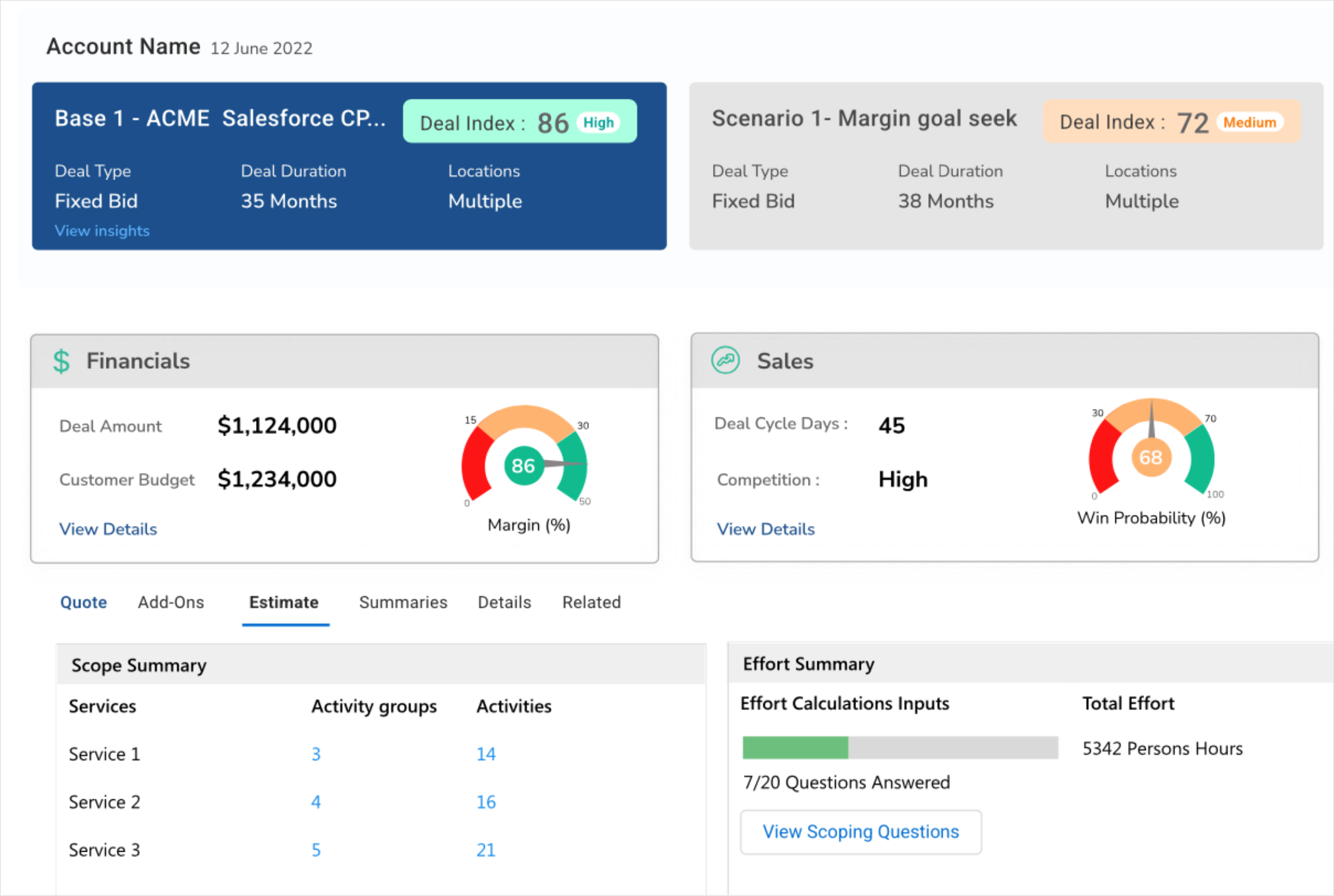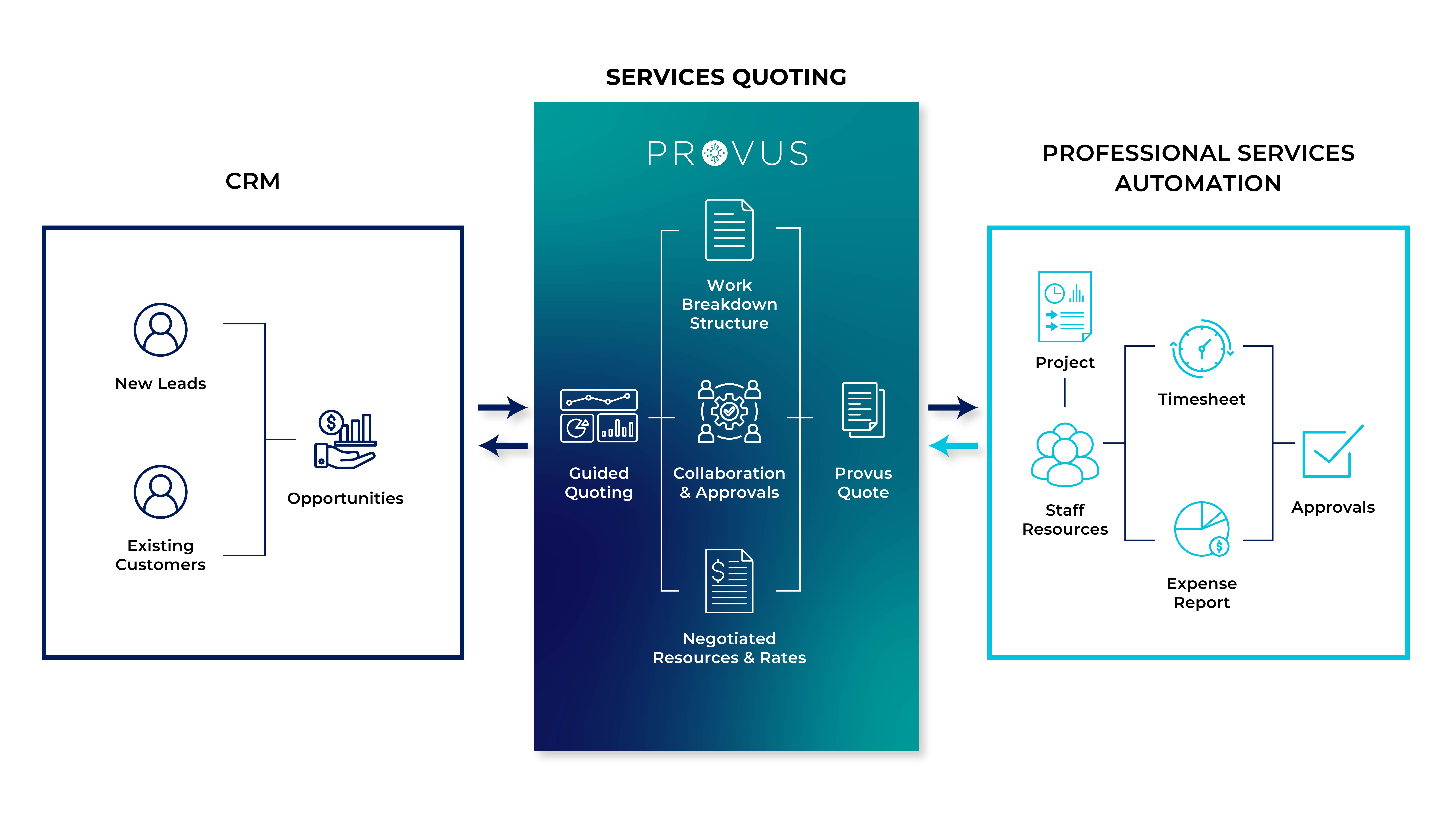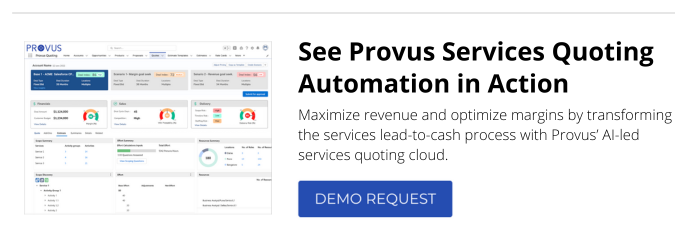There are many moving parts for Professional Services Organizations (PSOs).
You’ve got to identify leads and opportunities. Check up on the progress of current milestones and schedules. Then, forecast ROI and resource allocation for future projects.
All that, often before you’ve even attended the day’s internal meetings.
It’s an in-tray that spans everything from CRM to quoting and service delivery. With so many discrete parts, it’s easy for gaps to appear. The result is often:
- Margin erosion
Accurate services quoting relies on full visibility. Knowing where to find the percentage points that make a project viable and ensure it stays profitable throughout the lifecycle.
- Siloed knowledge
PSOs seek ways to keep information flowing and surfacing at the right time. But with disjointed systems, insights stay with individuals. They may have years of experience in knowing where to find the data on separate platforms. For those that don’t have access to the data, services quoting comes with a greater risk to closing deals and delivery services.
- Long-term scope creep
As a project evolves, unexpected costs can easily start adding up, especially if pricing is based on fixed costs rather than the added value that PSOs bring. It becomes harder to judge the financial impact of changes, both in the short term and further along the cycle.
It’s a dynamic scenario and one that’s unsuitable for static spreadsheets. After all, updating cells manually is laborious, repetitive, and prone to errors. Plus, with the lack of real-time integration, it’s harder to accurately assess the long-term impact on ROI.
Without full visibility, every change risks eroding margins and losing revenue. It also means less standardization, making it harder for the next sales rep to replicate the ideal Quote-to-Cash process.
Faced with this balancing act, services organizations are looking toward automating where possible and practical. Across every part of the project lifecycle.
What are the benefits of using Professional Services Automation?
PSOs are operating in a landscape that’s growing more complex, with new technology driving innovation, competition, and new market entrants. Naturally, this means finding new ways to ensure efficient project delivery and resource management. Far away from manual quote-to-cash processes.
That’s why many organizations have already turned to PSAs. They’re already using the technology to mature their usage and optimize processes. The challenge is that the PSA is a business-critical system. At the start of a deal, the PSA usually operates alone. It’s only after the sale that many organizations are tapping into it.
That’s why PSOs are looking at how to better harness Professional Services Automation (PSA) software to:
- Optimize resource forecasting
Accurately forecast resource capacity ensuring the business delivers on what’s been sold. - Save time on manual tasks
Leaving more time to focus on areas that require more specialist attention – from margin optimization to personalizing customer experience. - Increase visibility, transparency, and business intelligence
Decisions are enriched with on-demand insights, with data cleansed, collected, and visualized. - Maximize billable resources and team availability
Schedules are automatically up-to-date, making it easier to assign, predict, and re-adjust capacity. - Create repeatable and reliable end-to-end processes
Automation removes the risks of manual errors and inconsistencies, allowing companies to build up frameworks that can be adapted and shared internally. - Ensure timely payments and accurate billing
There’s less need for cross-referencing and manual routing. Instead, data can be captured, crunched, and validated from invoice creation to payment reconciliation.
Putting an automated framework in place means it’s possible to make adjustments in the right areas, rather than simply trying to achieve growth at every stage.
Automation also helps bridge one of the big challenges facing PSOs. Product CPQ solutions don’t easily map to the fluid nature of services quoting. The result is that sales reps are missing out on many benefits.
What are the benefits of Services CPQ?

When services quoting is optimized, organizations can scope and structure deals to:
- Maximize revenue
Improve deal win rates by accelerating sales cycles. Upsell and cross-sell to increase overall deal sizes. Model and compare different what-if scenarios. - Optimize margins
Managing deals that span multiple years, services, and regions. Making precise and informed decisions faster. Adopting pricing strategies to suit different scenarios. - Improve operational efficiency
Data is automatically gathered and aggregated, ready to be routed and scheduled based on predefined rules. You save time across the business and can open up automated workflows at scale when you integrate with tools such as CRM, PSA, and ERP. - Maintain compliance
Standardizing templates to avoid duplicated and out-of-date pricing, approvals, and processes. Building an audit trail that shows past actions and edit history. Complying with governance by using pre-defined logic, SOWs, and MSAs.
How do Services CPQ and Professional Services Automation complement each other?

Ultimately, it comes to building accurate quotes, closing deals, and allocating the appropriate resources to meet customer needs. Connecting your CPQ with your PSA allows you to bridge the gaps by tracking the entire quote-to-cash lifecycle. Moving beyond product-based CPQ solutions, professional services sales who utilize Services CPQ platforms can standardize their project planning phases, so they can focus on maintaining margins while also delivering the agreed services.
Here’s how it looks with a connected CRM, quoting, and automation process. Bringing a prescriptive methodology for the entire sales cycle across your:
- CRM
Leads come in, either as new prospects or as existing customers. They’re qualified as opportunities, before entering the next stage, services quoting. - Services Quoting
PSOs can generate a full work breakdown structure for guided quoting, and activate advanced pricing, with consistent and clean data in the PSA. - PSA
PSOs can use a system such as NetSuite OpenAir PSA to analyze information about the project, staff resources, timesheets, expenses, and approvals. This ensures real-time resource forecasting and gives sales reps confidence to adjust quotes.
Transforming the lead-to-cash process
Part 2 of the Mind The Gap Series will delve deeper into the connection of Services CPQ to CRM.
Accurate services quoting relies on full visibility, especially for complex projects, for clients operating across jurisdictions. Knowing where to find the percentage points that make a project viable and ensure it stays profitable throughout the lifecycle. The answer is to unify CRM, Services Quoting, and PSA. Each complements the other so that PSOs can streamline the Quote-to-Cash process and optimize the customer experience.
You can make it happen with OpenAir and Provus.









